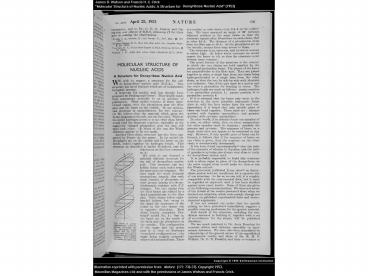RNA interference mechanism and applications PowerPoint PPT Presentation
1 / 38
Title: RNA interference mechanism and applications
1
(No Transcript)
2
(No Transcript)
3
(No Transcript)
4
(No Transcript)
5
(No Transcript)
6
(No Transcript)
7
(No Transcript)
8
(No Transcript)
9
(No Transcript)
10
(No Transcript)
11
(No Transcript)
12
(No Transcript)
13
(No Transcript)
14
(No Transcript)
15
(No Transcript)
16
(No Transcript)
17
(No Transcript)
18
(No Transcript)
19
(No Transcript)
20
(No Transcript)
21
(No Transcript)
22
(No Transcript)
23
(No Transcript)
24
(No Transcript)
25
RNA interference mechanism and applications Micro
RNA, RNAi, and SiRNA
26
Cell. 1993 Dec 375(5)843-54 The C. elegans
heterochronic gene lin-4 encodes small RNAs with
antisense complementarity to lin-14.Lee RC,
Feinbaum RL, Ambros V.Harvard University,
Department of Cellular and Developmental Biology,
Cambridge, Massachusetts 02138. lin-4 is
essential for the normal temporal control of
diverse postembryonic developmental events in C.
elegans. lin-4 acts by negatively regulating the
level of LIN-14 protein, creating a temporal
decrease in LIN-14 protein starting in the first
larval stage (L1). We have cloned the C. elegans
lin-4 locus by chromosomal walking and
transformation rescue. We used the C. elegans
clone to isolate the gene from three other
Caenorhabditis species all four Caenorhabditis
clones functionally rescue the lin-4 null allele
of C. elegans. Comparison of the lin-4 genomic
sequence from these four species and
site-directed mutagenesis of potential open
reading frames indicated that lin-4 does not
encode a protein. Two small lin-4 transcripts of
approximately 22 and 61 nt were identified in C.
elegans and found to contain sequences
complementary to a repeated sequence element in
the 3' untranslated region (UTR) of lin-14 mRNA,
suggesting that lin-4 regulates lin-14
translation via an antisense RNA-RNA interaction.
27
(No Transcript)
28
(No Transcript)
29
(No Transcript)
30
(No Transcript)
31
miRNA genes
- Most miRNA genes come from regions of the genome
quite distant from previously annotated genes,
implying they derive from different transcription
units (TUs) - The miRNAs within a genomic cluster are often
related to each other (but not always) - Not all of the cloned miRNAs are conserved even
in very closely related animals, such as
human/mouse, C. elegans/C. briggsae
32
(No Transcript)
33
The actions of small silencing RNA
A, mRNA cleavage specified by a miRNA/siRNA B,
translational repression specified by
miRNAs/siRNAs C, transcriptional silencing,
thought to be specified by heterochromatic siRNAs
34
(No Transcript)
35
(No Transcript)
36
(No Transcript)
37
Computational program to identify miRNA genes
- Significant progress has been made in miRNA
research since the report of the lin-4 RNA(1993).
About 300 miRNAs have been identified in
different organisms to date. - However, experimental identification miRNAs is
still slow since some miRNAs are difficult to
isolate by cloning due to low abundance
/stability/ expression pattern/cloning procedure.
Thus, computational identification of miRNAs from
genomic sequences provide a valuable complement
to cloning.
38
MiRNA today
Number of miRNA found Computational approach
experimentally validated Human200-255
175 Nematods103-120
100 Flies96-124
77
miRNA functions Fliescontrol of cell
proliferation, cell death and fat
metabolism Nematods neuronal patterning and
embryonic development. Mammals hematopoietic
lineage differentiation. Plants flower
development, leaf development and axial meristem
initiation

